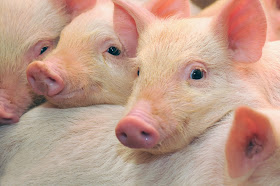Stress has major implications on the animal’s overall health, and with the summer heat approaching comes a perfect storm for stress. Pork producers not only have to worry about the normal sorting, loading and hauling stress on their herd, but they also have to address the additional challenges from heat stress.
Heat stress is a global problem, which jeopardises animal welfare, profitability and food security. Indirect effects of heat stress such as reduced feed intake contribute to, but do not fully explain, decreased productivity.
“Respiratory rates begin to increase around 21°C, and with high humidity, it becomes difficult for pigs to find relief from the heat on their own,” said Dr Jules Taylor-Pickard, European business director for Alltech.
When pigs become agitated from stress, one of the first things affected is their eating habits. When pigs eat less, they convert less feed into muscle, thus reducing average daily gain and potentially increasing their days to market. This also opens the door to an increased risk of health challenges and ultimately additional costs for producers.
Though stress cannot be fully avoided, it should be a goal to minimise it as much as possible. Dr Pickard suggests some quick tips to reduce heat stress and its effects:
“Antioxidant minerals as a part of a nutritional manipulation tool are commonly added to the diets of pigs reared under heat stress,” said Dr Pickard.
Heat stress is a global problem, which jeopardises animal welfare, profitability and food security. Indirect effects of heat stress such as reduced feed intake contribute to, but do not fully explain, decreased productivity.
“Respiratory rates begin to increase around 21°C, and with high humidity, it becomes difficult for pigs to find relief from the heat on their own,” said Dr Jules Taylor-Pickard, European business director for Alltech.
When pigs become agitated from stress, one of the first things affected is their eating habits. When pigs eat less, they convert less feed into muscle, thus reducing average daily gain and potentially increasing their days to market. This also opens the door to an increased risk of health challenges and ultimately additional costs for producers.
Though stress cannot be fully avoided, it should be a goal to minimise it as much as possible. Dr Pickard suggests some quick tips to reduce heat stress and its effects:
- Reduce instances of large swings in temperature in the pig units.
- Ensure each pig has enough space and ventilation.
- Provide pigs with unlimited access to fresh and cool drinking water.
- Move, transport and work pigs early in the day.
- Tailor diets to include technologies that support pigs during stress.
- Lower energy level of the diets.
“Antioxidant minerals as a part of a nutritional manipulation tool are commonly added to the diets of pigs reared under heat stress,” said Dr Pickard.
“The critical role of the gut in heat stress has been validated by many experimental studies, so improving gut integrity and health could make a substantial contribution to reducing the negative economic impact of heat stress in the swine industry.”
Visit the Alltech site HERE.
Visit the Alltech site HERE.
The Global Miller
This blog is maintained by The Global Miller staff and is supported by the magazine GFMT
which is published by Perendale Publishers Limited.
For additional daily news from milling around the world: global-milling.com


No comments:
Post a Comment